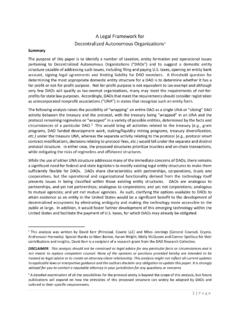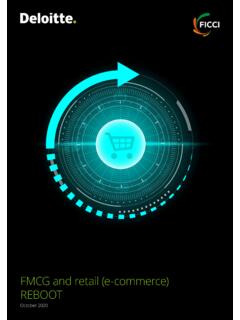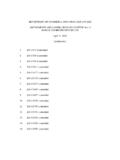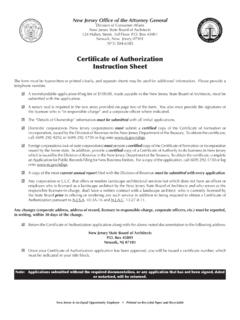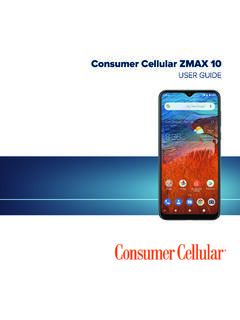Transcription of The web3 Landscape
1 The web3 LandscapeOctober 20212 2021 Andreessen Horowitz. All rights reserved believe that the next wave of computing innovation along with entirely new sectors of the economy will be built on decentralized technology. This technology has rapidly evolved beyond its financial origins. The community encompasses constituencies ranging from musicians and artists to small business owners and government agencies. Smart regulation must reflect that diversity of potential users and use cases. Decentralized technologies offer an alternative to a digital status quo that is increasingly dominated by big tech and oppressive regimes. Open, democratized systems can provide the infrastructure to power tomorrow s economy and institutions. Realizing that potential will depend on collaboration between government and the private sector to develop regulatory frameworks that encourage innovation while managing the risks inherent in different applications.
2 A16z is the largest investor in this space. Our team includes former officials drawn from across government, so we recognize the need for responsible regulation of this important new industry. As decentralized systems go mainstream, we look forward to working with regulators and lawmakers to set clear rules of the road that are good for consumers, entrepreneurs, and creators recognize that this space is technical and fast-moving. That s why we ve put together this primer to introduce some of the use cases about which we re most excited, each with additional readings for those interested in learning more. We hope this document will help demonstrate the incredible diversity and potential of this technology, and help policymakers better understand how to use these tools to deliver solutions on behalf of the communities they Applications.
3 4 Decentralized Autonomous Organizations (DAOs) ..7 Decentralized Finance (DeFi) ..9 Stablecoins & Central Bank Digital Currencies (CBDCs) ..12 Privacy & Digital Infrastructure ..14 The Creator Economy ..16 Blockchain-based Games ..19web3 Applications5 2021 Andreessen Horowitz. All rights reserved is it?During the first era of the internet from the 1980s through the early 2000s internet services were built on open protocols ( , TCP, IP, SMTP, HTTP). This created a stable, level playing field on which to build the ecosystem of the internet. It was during this period of innovation that many of the biggest web properties were the second era of the internet from the mid 2000s to the present businesses built a second layer of proprietary, closed protocols on top of the internet s open protocols.
4 This has been a period of centralization, as for-profit tech companies most notably Google, Apple, Facebook, and Amazon built software and services that rapidly outpaced the capabilities of open protocols. For example: Simple Mail Transfer Protocol (SMTP) is an open protocol that enables email. Google owns Gmail and Microsoft owns Outlook, but no one company owns the email-enabling protocol itself. However, in many cases, these closed protocols are not tech companies core business: individuals don t pay Google to use Gmail, but instead Gmail feeds into Google s core business of collecting data and selling ads. This is the world of Web As the saying goes: If you re not paying for it, you re not the customer. You re the product.
5 We are now in the early stages of developing web3, in which communities are incentivized and rewarded for maintaining and developing core it mattersThe decentralized networks of web3 offer an alternative to the broken digital status centralization has helped billions of people get access to amazing technologies, many of which were free to use, it has also stifled innovation. Right now, companies that own networks have unilateral power over important questions like who gets network access, how revenue is divided, what features are supported, how user data is secured, and so on. That makes it harder for startups, creators, and other groups to grow their internet presence because they must worry about centralized platforms changing the rules and taking away their audiences or classic challenge of decentralized networks is that they are public goods.
6 Without a central entity to control decisions and capture profits, it is hard to incentivize their maintenance and development. Crypto helps solve this problem through decentralized coordination and providing economic incentives for development. web3 will put power in the hands of communities rather than 2021 Andreessen Horowitz. All rights reserved networks are an important counter to the fragility of centralized applications. For example, in June 2021, internet users were unable to connect to top websites including The New York Times, the Guardian, Twitch, Reddit and the British government s homepage because a single company, Fastly, was crippled by a software bug. Decentralized systems avoid single points of networks can also neutralize the unilateral control exerted by centralized platforms.
7 For example, the decentralized, permanent data storage blockchain platform Arweave was used by activists in China to permanently upload copies of Hong Kong s Apple Daily before it was blocked by censors, and to save criticism of the country s coronavirus response before it was deleted from the social media platform Weibo. Further reading1. Why Decentralization Matters by Chris Dixon (OneZero)2. Blockchain Can Wrest the Internet From Corporations Grasp by Chris Dixon (WIRED)Decentralized Autonomous Organizations (DAOs)8 2021 Andreessen Horowitz. All rights reserved is it? Decentralized Autonomous Organizations or DAOs are online member-owned communities governed by the consensus of their members instead of centralized leadership.
8 DAOs represent exactly what they re called, because they are: Decentralized rules can t be changed by a single individual or centralized party. Autonomous votes are tallied and decisions implemented based on logic written into a smart contract, without human intervention. Organizations entities that coordinate activity among a distributed community of it sounds complex, there are real-world corollaries all around us. Employee-owned businesses like Publix grocery stores, or even the Green Bay Packers, are examples of public ownership structures without centralized leadership. DAOs are examples of what is known as on-chain governance. In traditional corporate governance, for example, companies have bylaws that dictate certain policies, such as how a board is elected.
9 A DAO extends this concept into the digital world by encoding these policies into smart smart contract is a persistent computer program that runs on a blockchain network. Like legal contracts, smart contracts are commitments, except they re written into computer code that executes automatically and autonomously. Why it mattersDAOs are an emergent governance model for new kinds of organizations built around transparency and inclusion. The principles can be applied to a wide variety of organizations, including non-profits, collectives, cooperatives, and investment structures determine how an organization makes decisions that align the interests of participants. The challenges with many existing organizational forms, such as corporations, are that decisions are not made in a transparent way and often stakeholders face high barriers to entry to participating in reading1.
10 A Beginner s Guide to DAOs by Linda XieDecentralized Finance (DeFi)10 2021 Andreessen Horowitz. All rights reserved is it?Decentralized Finance or DeFi refers to decentralized applications for finance, such as saving, lending, and exchange. Decentralized applications or dApps are computer applications whose code is written in a series of related smart contracts. These contracts are often referred to collectively as protocols. What distinguishes dApps from regular applications is that they are typically permanent they will exist as long as the blockchain hosting the protocol exists and cannot be changed or manipulated by malicious actors. They are also open, meaning that any computer can participate in the network, and access is not limited to a single or pre-defined group.
